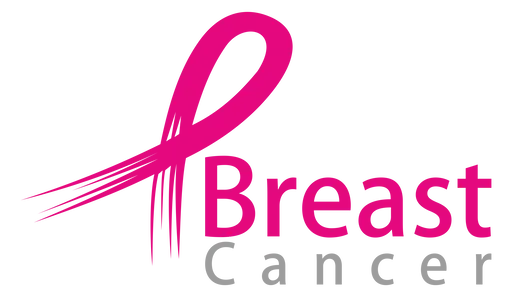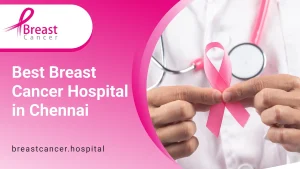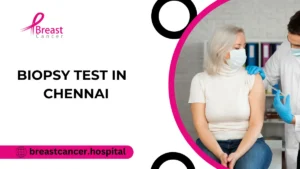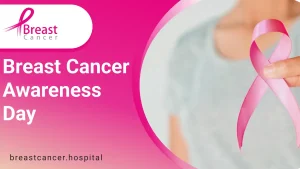Breast cancer stands as a prevalent health concern affecting women globally, underscoring the importance of understanding its risk factors and preventive strategies, as detailed in Breast Cancer Risk Factors and Prevention. Within this comprehensive guide, we aim to delve deeply into the pivotal factors that contribute to the risk of breast cancer. Additionally, we’ll explore effective measures for prevention, empowering individuals on their health journey to proactively manage their well-being.
Breast Cancer Prevention
Breast cancer prevention involves lifestyle modifications and medical interventions to lower the risk of developing the disease. Several strategies can help, including maintaining a healthy weight, engaging in regular physical activity, and consuming a balanced diet rich in antioxidants. Studies indicate that excessive alcohol consumption increases the risk of breast cancer by age, particularly in postmenopausal women. Avoiding smoking and reducing exposure to environmental toxins can also play a role in prevention.
Additionally, some women at high risk may opt for primary prevention of breast cancer through medications such as selective estrogen receptor modulators (SERMs) or aromatase inhibitors. Regular screenings and mammograms help in early detection, improving survival rates. Genetic testing for BRCA1 and BRCA2 mutations can also identify individuals with higher susceptibility.
Key Prevention Tips:
- Undergo regular screenings and mammograms for early detection.
- Maintain a healthy BMI and stay physically active.
- Follow a nutritious diet with plenty of vegetables, fruits, and whole grains.
- Limit alcohol intake and avoid tobacco use.
- Consider genetic counseling if you have a family history of breast cancer.
Breast Cancer Risk Factors and Prevention
Breast cancer is a complex disease influenced by various risk factors. Understanding these factors is crucial for early detection and prevention. Explore the key contributors to breast cancer risk:
Genetic Factors and Family History
- Genetic mutations like BRCA1 and BRCA2 significantly increase the risk of breast cancer by age.
- Family history of the disease, especially in close relatives, can elevate one’s susceptibility to developing breast cancer.
- Genetic counseling and testing, as emphasized in it, serve as invaluable tools for individuals seeking a deeper understanding of their genetic predisposition to breast cancer. These sessions enable individuals to gain comprehensive insights into their genetic profile, empowering them to make informed decisions regarding suitable preventive measures or potential treatment options based on their personalized risk assessment.
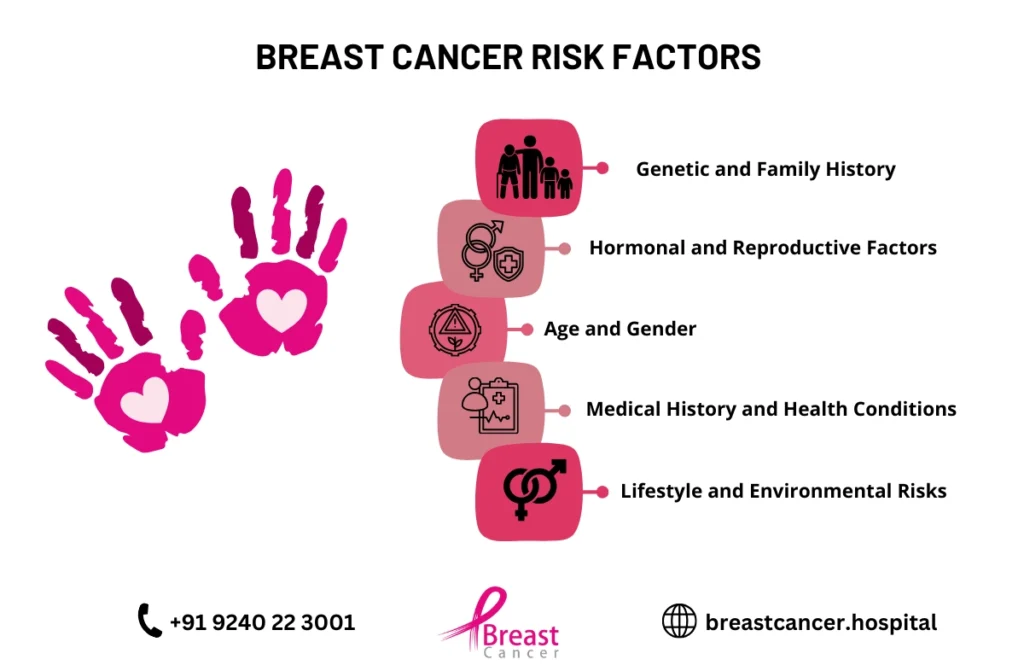
Hormonal Influences and Reproductive Factors
- Extended exposure to estrogen without intervals, as highlighted in it, poses a heightened risk factor for breast cancer. Instances like early onset of menstruation or late menopause, contributing to prolonged estrogen exposure, have been associated with an increased susceptibility to developing breast cancer.
- Delayed childbirth or having the first child after the age of 30 might contribute to increased vulnerability.
- Hormone replacement therapy (HRT) and certain oral contraceptives can also impact breast cancer risk.
Lifestyle and Environmental Factors
- Sedentary lifestyles, excessive alcohol consumption, and a diet high in processed foods and saturated fats may elevate the risk.
- Environmental factors like exposure to radiation or certain chemicals may play a role in increasing susceptibility to breast cancer.
- Regular exercise, maintaining a healthy weight, and adopting a balanced diet can mitigate these risks.
Early Detection and Treatment
- Improved Treatment Success: Detecting breast cancer in its early stages often means a more favorable prognosis. When the cancer is small and localized, treatment options tend to be more effective, and the chances of successful treatment and recovery are higher.
- Less Invasive Treatment: In the context of it, it’s important to note that early-stage breast cancer often necessitates less aggressive treatment approaches. These may encompass interventions such as lumpectomy, targeting the removal of the tumor rather than resorting to mastectomy, which involves complete removal of the breast. Furthermore, less aggressive treatment modalities like targeted therapies or hormone therapy might suffice for managing and treating early-stage breast cancer, providing a more tailored and focused approach to treatment.
- Reduced Risk of Spread: Early detection of breast cancer is crucial in preventing its spread and minimizing the need for extensive treatments. Regular screenings and awareness are key components of early detection. Understanding it allows for proactive measures, and enhancing prevention strategies. If concerned about breast cancer risk, consult with healthcare professionals for personalized assessments and guidance.
- Enhanced Quality of Life: Early detection allows individuals to maintain a better quality of life during treatment. It minimizes the physical and emotional impact of more aggressive treatments and reduces the risk of complications.
- Regular Monitoring and Follow-up: Even after successful treatment, regular follow-ups and monitoring are crucial to detect any potential recurrence or new developments early. This ongoing vigilance ensures timely intervention if needed.
Risk Factors You Cannot Change
Unchangeable Risk Factors for Breast Cancer
Certain factors that increase the risk of breast cancer are beyond an individual’s control. These include:
- Gender: Women are far more likely to develop breast cancer than men.
- Age: The risk of breast cancer increases with age, especially after the age of 50.
- Family History: A family history of breast cancer, particularly in first-degree relatives (mother, sister), increases your risk.
- Genetic Mutations: Inherited mutations such as BRCA1, BRCA2, and other genetic mutations can significantly increase the risk. These genes play a role in repairing damaged DNA, and mutations can prevent this process, allowing cancer cells to grow.
These factors are crucial to understanding your risk profile, but it’s important to note that having one or more of these factors does not guarantee the development of breast cancer.
Risk Factors You Can Change
Changeable Risk Factors for Breast Cancer
While you cannot control factors like your age or genetics, there are several lifestyle-related factors that you can manage to lower your risk of breast cancer:
- Diet: A diet high in fruits, vegetables, and whole grains can reduce your risk. Limiting red meat and processed foods may also help prevent breast cancer.
- Physical Activity: Regular physical activity can lower the risk of breast cancer. Aim for at least 30 minutes of moderate exercise, five days a week.
- Alcohol Consumption: Drinking alcohol increases the risk of breast cancer. Limiting alcohol intake or avoiding it completely can lower your risk.
- Smoking: Smoking has been linked to an increased risk of breast cancer, especially in premenopausal women. Quitting smoking is a significant step in reducing your risk.
Making healthier lifestyle choices can help reduce the likelihood of developing breast cancer. Implementing these changes can also improve your overall health.
Who is at High Risk for Breast Cancer?
Identifying High-Risk Individuals
Some individuals are more likely to develop breast cancer due to a combination of personal, familial, and genetic factors. These include:
- Family History: If you have a mother, sister, or daughter with breast cancer, your risk may be higher.
- Early Menstruation or Late Menopause: Women who started menstruating before age 12 or who went through menopause after age 55 are at higher risk.
- Previous Breast Cancer: If you have had breast cancer before, you are more likely to develop it again.
- Personal History of Other Cancers: If you’ve had other types of cancer, like ovarian cancer, you may be at an increased risk for breast cancer.
These individuals may benefit from more frequent screenings or genetic testing to better understand their risk.
Which Treatment is Right for Me?
Once diagnosed with breast cancer, your treatment options will be influenced by various factors, including the stage of the disease, your age, overall health, and the type of breast cancer you have. Common treatments include:
- Surgery: The removal of the tumor or entire breast (mastectomy) is common.
- Chemotherapy: This treatment uses drugs to destroy cancer cells or slow their growth, particularly for more aggressive cancers.
- Hormone Therapy: For cancers that are hormone receptor-positive, hormone therapy can help block or lower the levels of hormones that fuel cancer growth.
- Targeted Therapy: This treatment targets specific molecules involved in the growth and spread of cancer cells.
The treatment plan will be customized based on your personal risk factors and the specifics of your breast cancer diagnosis.
Emerging Breast Cancer Risk Factors
In recent years, researchers have identified new and emerging it that may influence the likelihood of developing the disease. Environmental exposures, such as pollutants, endocrine-disrupting chemicals, and radiation, have been linked to increased risk. Studies also suggest that chronic inflammation, often caused by obesity or poor diet, may contribute to breast cancer development.
Additionally, advancements in genetics have revealed that beyond BRCA mutations, other genetic variations might play a role in individual susceptibility. Stress and psychological health are also being studied as potential contributors, with some evidence suggesting that chronic stress and lack of social support may impact immune function and increase cancer risk
Strategies for Breast Cancer Prevention
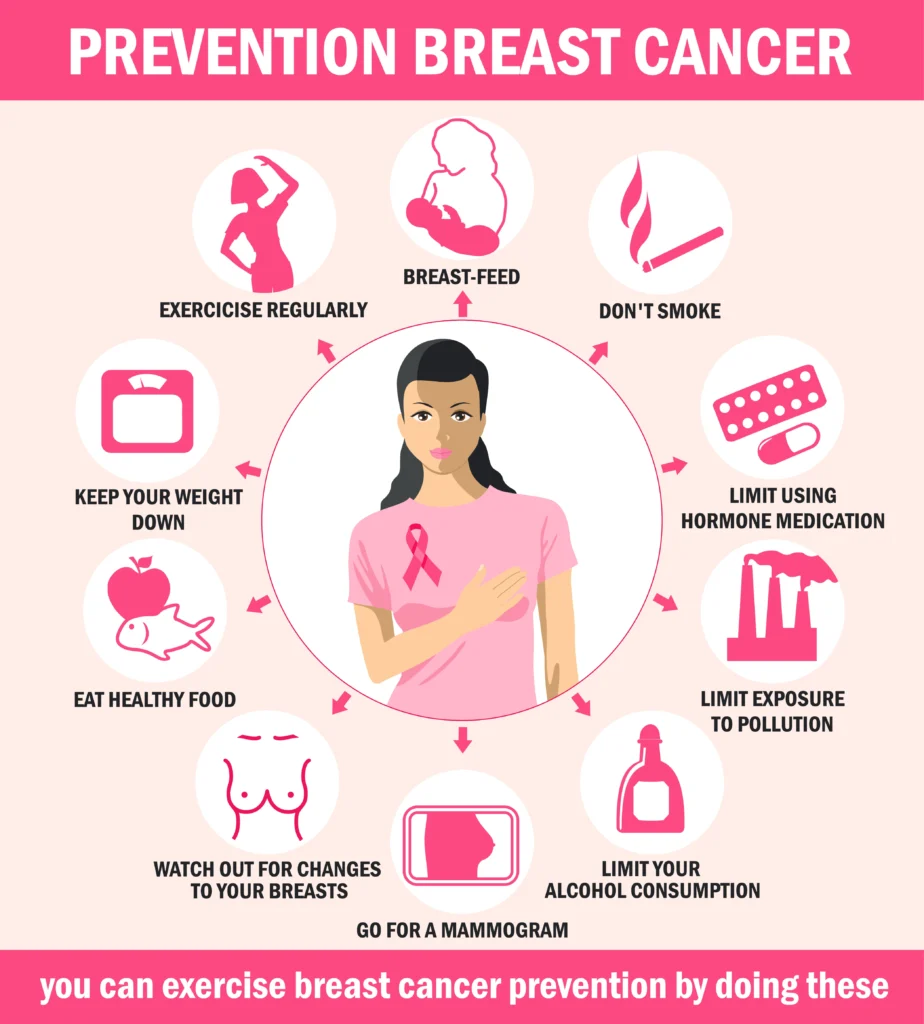
- Know Your Risk Profile: Understanding your family history and genetic predisposition are paramount, especially concerning breast cancer risk factors and treatment. If you have a family history of breast cancer, considering genetic counseling and testing becomes crucial. These measures offer valuable insights into your genetic profile, aiding in a comprehensive understanding of your risk factors and guiding informed decisions regarding treatment or preventive strategies.
- Healthy Lifestyle Choices: Maintain a healthy weight, engage in regular physical activity, limit alcohol intake, and follow a balanced diet rich in fruits, vegetables, and whole grains.
- Regular Screenings: Stay vigilant with routine mammograms and clinical breast exams. Perform monthly breast self-exams to detect any changes or abnormalities early.
- Avoiding Hormone Replacement Therapy: Discuss alternatives to hormone replacement therapy with your healthcare provider if needed, considering its impact on breast cancer risk.
Breast cancer risk factors and treatment are deeply intertwined, emphasizing the significance of preventive measures in reducing vulnerability to this disease.
What Can I Do to Lower My Risk of Breast Cancer?
While you cannot change your genetics or age, there are effective ways to reduce your risk of breast cancer and promote overall health. Here are actionable steps that contribute to breast cancer prevention:
1. Regular Physical Activity
2. Maintain a Healthy Weight
3. Limit Alcohol Intake
4. Breastfeeding
5. Avoid Hormone Replacement Therapy (HRT)
6. Screening and Early Detection
Symptoms of Breast Cancer
Recognizing the early signs of breast cancer is essential for prompt diagnosis and treatment. Some common symptoms include:
- A lump or thickening in the breast or underarm
- Changes in the shape or size of the breast
- Nipple discharge, including blood
- Redness or dimpling of breast skin
- Pain in any area of the breast
- Inverted or retracted nipple
- Unexplained weight loss and fatigue
If you experience any of these symptoms, consult a doctor immediately. Regular screenings can help in early detection and increase the chances of successful treatment.
Conclusion
Understanding breast cancer risk factors and taking proactive steps towards prevention, as highlighted, are foundational in upholding women’s health. Being cognizant of the factors contributing to breast cancer and actively adopting preventive measures empowers individuals to markedly decrease their likelihood of developing this condition. Let’s persist in raising awareness and fostering a supportive environment that prioritizes health and well-being for all.
Also, Read Best Breast Cancer Hospital in Chennai.
